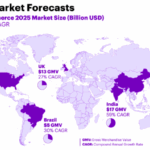A group of European retail associations has sent a formal letter to the European Commission urging it to take action against what they describe as excessive and unjustified card payment fees charged by Visa and Mastercard.
These fees, which retailers must pay every time a customer uses a Visa or Mastercard, have steadily increased over the years. According to the letter, Visa and Mastercard currently process about two-thirds of all card payments in the eurozone. Retailers say this gives the two companies enormous power, with little oversight or accountability.
The core concern is the lack of transparency. Retailers say that fees continue to rise every year without clear reasons or detailed explanations of what the charges are for. A study cited in the letter found that these fees have increased by 34 percent over the past four years, even when inflation is not factored in. That averages out to about 7.6 percent more each year—a cost that businesses are struggling to absorb.
Because these fees are typically non-negotiable, retailers argue that they have no real choice but to pay them or risk losing customers who prefer paying with cards. The problem, they say, is that the companies behind the cards—Visa and Mastercard—can raise the fees whenever they want, and retailers are left with no say in the matter.
Trade groups believe this is stifling competition in the payments market. With Visa and Mastercard dominating the space, new or smaller payment providers face steep barriers to entry. This makes it difficult for innovation to thrive and limits the number of options available to both businesses and consumers.
The letter sent to the European Commission is asking for more oversight and stronger regulation. Retailers want the EU to investigate how these fees are set, and to explore options for capping or controlling them. They also want clearer rules about how much information card networks must share about their pricing and operations.
Retailers say that unless something changes, they may be forced to pass these rising costs on to customers—something many are reluctant to do. For now, the ball is in the European Commission’s court, and many across the retail and finance sectors will be watching to see how it responds.










